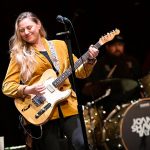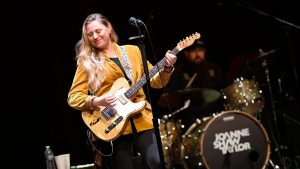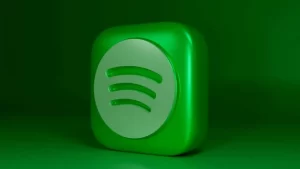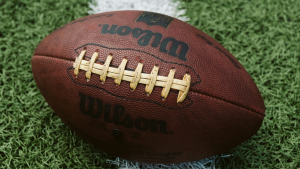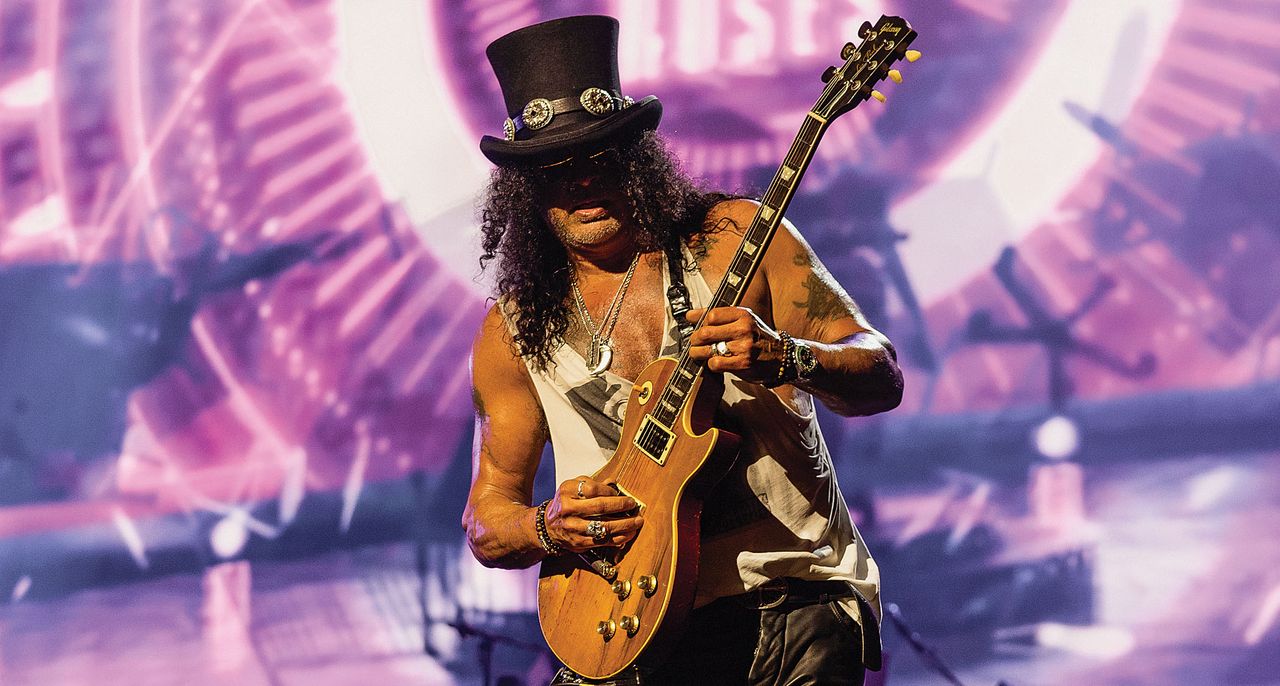
“A lot of the issues were to do with management and stuff that pitted me and Axl against each other”: Slash on his return to Guns N’ Roses, changing up the Sweet Child O’ Mine solo, and what needs to happen for a new GNR album
(Image credit: Guns N’ Roses)
Slash was there when, in the aftermath of Guns N’ Roses’ 1987 debut album, Appetite for Destruction, the band suddenly exploded onto a chaotic arc from Sunset Strip hopefuls to one of the biggest, most debauched rock acts on the planet – so it’s hard to imagine anything phasing him.
But when the guitar maestro considers how far GN’R has come since his and bassist Duff McKagan’s return in 2016, his mind is clearly blown. As he tells Guitar World, “It really trips me out that all of this has happened.”
From the outside looking in, of course, Slash’s return to the GN’R fold seemed inevitable. Behind the scenes, though, he and GN’R vocalist and leader Axl Rose barely spoke after the guitarist left the band in 1996, let alone thought about teaming up to take on the world again. And even when he did agree to cozy up alongside Rose again, he didn’t exactly have the long haul in mind.
“It sounds crazy, but when I first got involved again, it was just to do a couple of shows, one of which was Coachella,” Slash says. “We’d been getting these offers to do that event for years, so Axl and I got together, sat down, and hashed out a lot of stuff that had built up over the years. That’s when he said, ‘We get these offers to do Coachella. Do you want to do it?’ I said, ‘Yeah, that would be fun.’”
So much fun, in fact, that Slash is still here, nine years later. But this isn’t your father’s Guns N’ Roses. There are no more hardcore drugs, no more binge-drinking benders, and no more infighting – the factors that tore the band apart in the first place.
“That’s the best way to put it,” Slash says. “But other than changes in the way things were handled back in the day, it’s just maturing… and maybe the lack of massive substance abuse on my part. [Laughs] I can’t speak on everybody else’s behalf, but all those things play into it. It’s a perfect storm of a lot of things.”
Guns N’ Roses – Paradise City (Official Music Video) – YouTube
Watch On
That perfect storm has seen Guns N’ Roses go from a legacy act – who went through lead guitar players like it was going out of style in the early 2000s – to regrouping and picking up where they left off after the Use Your Illusion tour in the early Nineties.
All the latest guitar news, interviews, lessons, reviews, deals and more, direct to your inbox!
“We did Coachella, and then we just kept going,” Slash says. “It never really stopped. The only thing that [temporarily] stopped it was Covid, because we were just going from tour to tour and having a great time.”
Having a cache of iconic songs to revisit surely made having a great time much easier. But for Slash, these aren’t just any songs. For the most part, these are songs defined by his riffs and his solos, which the guys who kept his spot warm for 20 years could never quite replicate.
Guns N’ Roses – You Could Be Mine (Live In New York, Ritz Theatre – May 16, 1991) – YouTube
Watch On
Yeah, you could say Slash is Guns N’ Roses’ proverbial X factor. But it has nothing to do with top hats (though he makes those look damn cool), nor does it have to do with Les Pauls slung low (because those are always cool), but the vibe he elicits from the stadium-sized audiences GN’R perform to every night.
“I don’t want to sound cliché,” Slash says, “but every show is so contingent on the audience. That sort of reciprocal energy is what drives it, and that has been solid for this whole run since I’ve been back in it. That’s how it was from our inception back in the day, up until I left in 1996.”
The last part of that statement, specifically about leaving in 1996, is particularly critical when it comes to Guns N’ Roses. Despite their issues, Axl Rose and Slash epitomize that classic lead singer/lead guitarist dynamic. It’s magic – but in 1996, that magic died.
I don’t want to sound cliché but every show is so contingent on the audience. That sort of reciprocal energy is what drives it
Yes, the post-Slash lineup of GN’R gave us 2008’s Chinese Democracy, and yes, it was kind of fun to see Buckethead shred with Guns N’ Roses. The same goes for Robin Finck and Ron “Bumblefoot” Thal – but we wanted to see the band that gave us Appetite for Destruction and Use Your Illusion I and II.
We wanted Slash. We wanted him to welcome us back to the jungle, and we wanted him to dance with Mr. Brownstone (figuratively). And now that he has, Guns N’ Roses are stronger than ever.
(Image credit: Guns N’ Roses)“We’re fortunate to be a band whose material has stood the test of time like that,” Slash says. “And we’re fortunate to be appreciated this far out. To be able to maintain that much interest, you have to consider yourself really fucking lucky, and that’s the way I see it. It’s been quite a ride.”
That ride isn’t over yet. GN’R has shows planned around the world in 2025, aiming to circle back to America for yet another stadium-sized victory lap. After that, their long-awaited reunion album just might be in the works… but not until the time is right. More on that later.
For the time being, Slash is vibing and enjoying the ride in a way his younger self maybe couldn’t.
“I constantly have to stop and be thankful that we’re able to do something that I love so much,” he says. “There’s really nothing like it. To be able to go out there and play for three hours is really a blessing.”
The chemistry within Guns seems stronger than ever. How come?
I have no idea. [Laughs] I think a lot of the stuff that was an issue for Guns in the early days – especially in the Nineties – had to do with management issues and stuff that pitted me and Axl against each other. And it worked; it definitely worked.
But without that element, he and I get along great. Duff and I have always gotten along great, and I love working with Richard Fortus. He and I make a really great guitar team, and he’s just a good guy. We all get along really well, and we have a good time doing what we do.
Guns N’ Roses – It’s So Easy – YouTube
Watch On
What’s it been like playing beside Richard compared to Izzy Stradlin and Gilby Clarke?
Richard is a great all-around guitar player. He can do it all. And the cool thing about him is that of all the guys who were in the band when I wasn’t – like Buckethead, Bumblefoot, and DJ [Ashba] – he was the only one I’d worked with prior.
He was there for a minute, and with all those guys in there, I don’t know how that would have worked when I came back. And there was a lot of expectation that Izzy was going to do this, but Richard was there that first day we started rehearsals, and I was given the opportunity to see if I liked working with him or not.
Although we did toy with the idea of Izzy coming back, Richard was always there. I felt really at ease and comfortable with Richard staying in when Izzy didn’t work out.
Izzy is such a recluse; it’s difficult to imagine him playing so many big shows on such a grand scale.
Well, it was weird coming back into it for me. So we had just started to rehearse, and the depth of the material at this point, and the level of playmanship and all that kind of stuff, since the Nineties, was where everybody had been growing as players.
We were all really eager to get better and just keep evolving. But I don’t know where Izzy would have fallen in at that time. I have no idea, because we never really got a chance to jam at any of those initial rehearsals for the Not In This Lifetime tour.
So I don’t know what it would have been like. Everybody has been constantly working this whole time and growing as musicians, but I don’t know what he’s been up to on a musical level.
(Image credit: Guns N’ Roses)Looking back, how did you write the riff for Appetite for Destruction’s first track, Welcome to the Jungle?
Welcome to the Jungle is funny because when that riff came to me, Axl had come over, and I played him that riff, right? And then, we had our first rehearsals at this guy Nickey Beat’s studio in Silver Lake in L.A., and on that first day, we were like, “What are we going to play?”
This is when the band first got together – the classic lineup with Steven [Adler] and Izzy. Axl goes, “Why don’t you play that thing you were playing to me earlier?” And that’s where Jungle started.
We all fell into where I had the riff – and Izzy and everybody just had different input. That’s how all our songs worked. No matter who came up with the initial idea, everybody was hands-on.
Guns N Roses – Coma (Chicago 1992) 4K60FPS – YouTube
Watch On
Did the solo come just as spontaneously?
I remember doing the solo, but I can’t remember how we ended up in C#. [Laughs] I remember changing a couple of notes around the chord changes, and the solo just came together. But all of that material on Appetite, musically, almost wrote itself.
I can’t remember too much time being spent on any one particular song where we were trying to get the arrangement right. Everything had to be done in the studio at Nickey Beat’s, and entire songs came out of it. And Jungle was one of those, where it really came together in the time it took to have a session.
Is it true that you didn’t initially like Sweet Child O’ Mine?
Yeah, I have to admit I did have a thing with it. [Laughs] It was a riff I came up with, and I didn’t know what I was going to do with it. I wasn’t really thinking about it at the time, but it inspired the whole song. I always say this, but to me, we were like a Motörhead-type hard rock band, so any kind of ballads were sort of uncongressed. [Laughs] But it really became part of our set.
We played it one time opening for Ted Nugent, and when it was time to play that song, I was like, “Oh, fuck…” [Laughs] And, of course, I had to remember how to play the riff accurately by myself in front of everybody every time we played, which, at the time, I was a little drunk, and you never knew what was going to happen. [Laughs]
How do you feel about the song now?
As luck would have it, it was the single that actually broke the band. It’s a great song, and I don’t have any issues with it. I had issues with it back in the early days when I’d go out and play it, but it’s become one of the big tentpole songs in the set. So it is what it is. [Laughs]
Guns N’ Roses – November Rain – YouTube
Watch On
When people talk about your guitar solos, November Rain always comes up.
Yeah. But all the solos, that one included, were very spontaneous and at-the-moment when the song was written. You figure out what the chord changes are going to be and then just do whatever you feel. The November Rain solo, which sounds so structured to me now, was just what happened in the moment.
Can you visualize how you came up with it?
The first version of November Rain we did was on acoustic. Even though Axl wrote it on piano, we didn’t always have a piano, so we used to play it on acoustic, and that solo was there. That was just the spontaneous way it went.
Whenever we do any kind of jams, very little time is spent working shit out. You just go for it by the seat of your pants and see what happens
I think what happens is you come up with a basic melody that comes to mind when you play the song, and the more you play the song, the more it starts to have a vocal life of its own. That’s what a solo should be. It’s an extension of whatever the song is. It’s another melody, a counter-melody, or an extension of the vocal, but it should be lyrical and melodic.
How do you feel about those solos when you play them now?
I have to admit, it feels weird. Like, if I get hung up one night and don’t feel like playing the solo for Sweet Child O’ Mine and I play something else – and that does happen, especially if I break a string – it feels weird if I don’t play the solo the way it’s supposed to go. I know people get really disappointed if I don’t play it the way they’re used to hearing it.
That’s the double-edged sword. It’s cool because it means something in the context of the song; it’s not just a ripping solo that comes, goes, and is forgettable. It means it has some tenacity.
But then again, you can’t just go off on a tangent like I would like to do sometimes in songs like that. [Laughs] Because it just doesn’t feel right. You feel like you’re missing something if you don’t play it the way that you hear it, or heard it originally, you know?
Guns N’ Roses – Nightrain (Tokyo 1992) HD Remastered – YouTube
Watch On
Those solos sound so well-planned, like mini-compositions. It’s hard to believe they were just off the cuff.
Yeah, they really all were. I don’t remember ever sitting down and figuring any of them out. Especially Jungle. I remember going into that, and it sounds very structured to a point, but that’s just what the chord changes were. It’s interesting to think back on sometimes. When you’re onstage, your mind wanders, and I’ll go back and think about stuff like that. [Laughs]
When you play Rocket Queen live, it features an open-ended jam.
That whole jam section has been there since the Nineties. When Guns was doing the stadium tours back then, we started to extend parts of certain songs to make jams out of them and really just made them up on the spot. You really didn’t know what the structure was.
(Image credit: Guns N’ Roses)How has that evolved since you’ve been playing with Richard?
[Initially] he was doing a solo section, I was doing a solo section, and then it would get back to the arrangement of the solo section of the song, which is a slide solo thing, and it’s evolved a bunch of different times in different ways.
And now we’ve added a piano part and some more chord changes, and Richard does this fucking ripping solo, and I go into a voice-box solo afterward. We’ve been doing it that way on this tour, and it seems to hold its own that way, so it feels a bit more structured now.
But whenever we do any kind of jams, very little time is spent working shit out. You just go for it by the seat of your pants and see what happens. [Laughs] And since you’re playing however many nights a week, you can remember what was fucked up from the night before and work on it in the moment.
On the gear side of things, you’re forever associated with the Gibson Les Paul, but you’ve been using everything from B.C. Rich Biches to Gibson ES-335s.
It’s just one extended evolution, right? It started out with gear that wasn’t mine back in the day, and then in the Nineties we had a touring apparatus where we needed to have reliable shit. I was using three Marshall Jubilees back then, which were a new thing at the time.
I happened to get them because, if I remember correctly, they came from Guitar Center, and I got them for cheap, or if not, for free… somehow. I can’t remember exactly how I got them, but I had them. [Laughs]
So those were in my touring rig. Then I had two Les Pauls I got from Gibson, which are affectionately named Jessica and Stephanie. I still use Jessica, and I still have Stephanie. And then, during the Nineties, because there was so much material on the Use Your Illusion records, I started picking up different guitars for different sounds.
Guns & Roses [HD 1080p 16/9] : Double talkin’ Jive.. Motherf**cker – Live Tokyo 1992 – YouTube
Watch On
You had a B.C. Rich Mockingbird back in the day, too.
The Mockingbird was actually the first professional, brand-name guitar I ever got. I was always a big fan of B.C. Riches, and I worked in a guitar store in Hollywood that was a B.C. Rich authorized dealer.
I had a lot of interaction with B.C. Rich as a kid, and when we were doing Use Your Illusion, I actually had enough money to buy a new guitar, so I picked up a used Mockingbird, an early-Eighties one, which I still use on the road.
I also picked up an Eighties Les Paul goldtop that was really amazing, and some other odds and ends while we were making the Use Your Illusion records. When we went out on the tour, I took all that gear with me, and I still use some of it.
You’ve incorporated a lot of other instruments since then, right?
Yeah, I picked up a lot of stuff over the 20 years when I wasn’t in Guns N’ Roses, like different types of Les Pauls. I started working with Gibson on a lot of signature models, the double-necks and so on. And with Guild, I designed a [Crossroads] double-neck acoustic-electric that I predominantly used for Civil War in the early Nineties.
That’s still around and I still use it. But lately, the mainstays are a killer B.C. Rich Bich and the guitar that’s a replica of the guitar I recorded Appetite on… which was a replica of a Gibson Les Paul.
(Image credit: Guns N’ Roses)A replica of a replica!
Yeah. [Laughs] That’s on the road with me. And I’ve been really into Gibson ES-335s lately. I have one of those on the road, and some really amazing handmade [Leo] Scala guitars, but I don’t take vintage guitars on the road as a rule. I’m too hard on them, so I pick up new stuff. I’ve gotten different things for different songs, basically.
For amps, I switched from Marshall to Magnatone in the last couple of years. And on the What You Want and What You Get Are Two Completely Different Things tour, I’ve been using newly co-designed 100-watt Magnatone heads and matching 4×12 cabs.
When you returned to Guns nine years ago, did you imagine you’d be packing stadiums with the world at the band’s fingertips again?
No, I didn’t! It’ll be 10 years in March 2026, and I’m tripping that so much time has gone by. Like I was saying before, I’m blown away that we’ve managed to have such a great following this whole time.
Is there a new album in GN’R’s future?
There’s so much material at this point – it’s a matter of having the discipline to sit down and fucking get into it. But the thing with Guns is, in my experience, you can never plan ahead. You can never sit down and go, “We’re going to take this time, and we’re going to do this.”
Every time we’ve done that, it falls apart. It just spontaneously happens through some sort of inspiration that triggers it. And the next thing you know, it’s off and running. So it’s coming. I know it’s coming because everybody is thinking about it. It’ll just happen when it happens.
This article first appeared in Guitar World. Subscribe and save.
Andrew Daly is an iced-coffee-addicted, oddball Telecaster-playing, alfredo pasta-loving journalist from Long Island, NY, who, in addition to being a contributing writer for Guitar World, scribes for Bass Player, Guitar Player, Guitarist, and MusicRadar. Andrew has interviewed favorites like Ace Frehley, Johnny Marr, Vito Bratta, Bruce Kulick, Joe Perry, Brad Whitford, Tom Morello, Rich Robinson, and Paul Stanley, while his all-time favorite (rhythm player), Keith Richards, continues to elude him.




